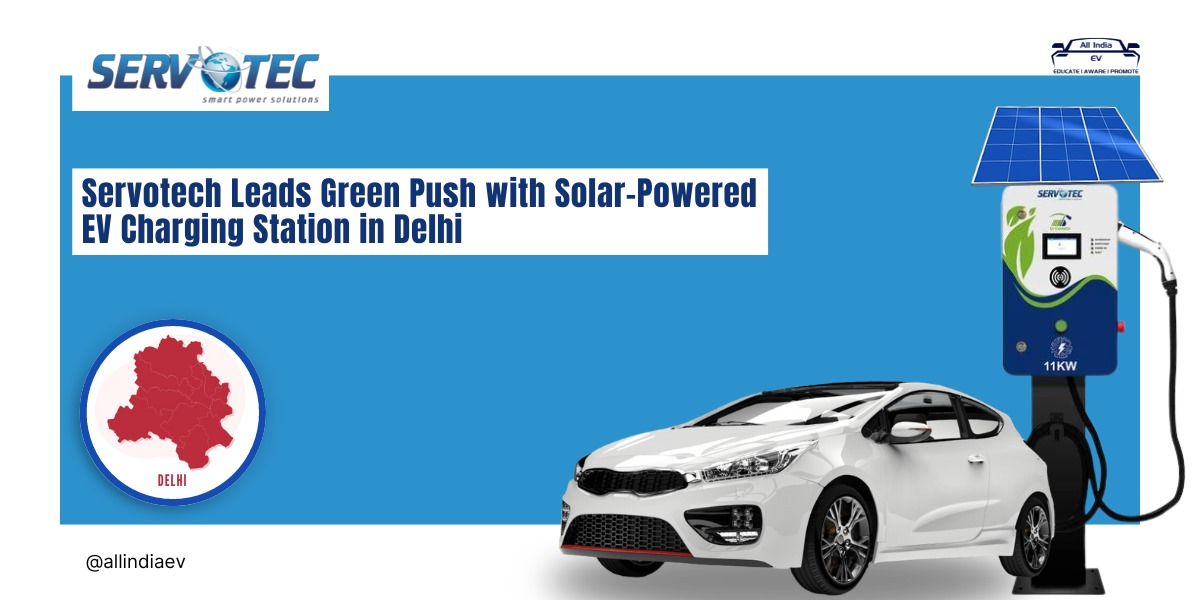
Servotech Leads Green Push with Solar Powered EV Charging Station in Delhi
Servotech Power Systems Ltd., a leading manufacturer of EV chargers and solar solutions, in collaboration with India’s apex solar organization, the National Solar Energy Federation of India (NSEFI), has inaugurated Delhi’s first grid-connected Solar Powered EV Charging Station.
This Solar-Powered EV Charging Station, established as a pilot project at the Hauz Khas Village parking station, marks a significant milestone in sustainable energy and electric vehicle infrastructure. Servotech has manufactured, designed, and commissioned the solar panels and EV chargers used to establish the carport.
Additionally, Servotech has been responsible for designing and implementing the overall infrastructure for the carport.
Dr. Philipp Ackermann, German Ambassador to India and Bhutan, was the chief guest at the event, inaugurating the solar-powered EV charging station in the presence of Mr. Raman Bhatia (Founder and MD, Servotech Power Systems Limited) Mr. Amarjeet Singh, (CEO, BSES Yamuna Power Limited) Mr. Chintan Shah, (Principal Advisor, NSEFI) and Mr. Subrahmanyam Pulipaka, (CEO, NSEFI). This initiative is a collaboration between the National Solar Energy Federation of India (NSEFI) and the Bundesverband Solarwirtschaft e.V (BSW), in cooperation with BSES and the Municipal Corporation of Delhi (MCD).
The Solar-Powered EV Charging Carport was established under the KVP project framework. The KVP project is supported by the German non-profit company Sequa GmbH, as part of the Business Membership Organization Partnerships of the German Federal Ministry for Economic Cooperation and Development (BMZ). This PV Carport introduces a new business model for DISCOMs and business operators aiming to replace last-mile delivery vehicles with an electric fleet. The system enables fast charging for two and four-wheelers in under an hour, facilitating efficient delivery services in inner-city and confined spaces.
“We are thrilled to inaugurate Delhi’s first solar-powered EV charging carport along with NSEFI, marking a significant step towards sustainable urban mobility for a greener future. The newly inaugurated solar carport exemplifies our efforts to reduce carbon emissions and enhance living conditions through sustainable technology. This initiative will prove to be beneficial in decarbonizing mobility and electricity through solar energy. The growth of India’s solar
Raman Bhatia, Founder and Managing Director, Servotech Power Systems Ltd
and energy storage sectors across various fronts is dynamic, and by integrating renewable energy solutions into our infrastructure, we not only address current environmental challenges but also pave the way for a cleaner, more sustainable future for all. Servotech stands for innovation and is committed to leading the charge in sustainable energy solutions, driving positive change for the environment and society.”
Why India needs Solar Powered EV Charging Station?
India, with its rapidly growing urban population and increasing demand for transportation, is facing significant environmental challenges. The adoption of solar-powered EV charging stations can play a crucial role in addressing these issues. Here are several reasons why India needs to embrace this technology:
Rising Air Pollution Levels: Major Indian cities like Delhi, Mumbai, and Bangalore consistently rank among the most polluted in the world. According to the World Health Organization (WHO), air pollution in India causes around 2 million premature deaths each year. Transitioning to electric vehicles (EVs) powered by renewable energy can significantly reduce emissions from conventional fossil fuel-powered vehicles, contributing to cleaner air and healthier living conditions.
Economic Benefits: Solar energy has become increasingly cost-effective. The levelized cost of electricity (LCOE) for solar PV in India is among the lowest in the world, at around $0.037 per kWh. By integrating solar power into the EV charging infrastructure, India can achieve significant cost savings on energy expenses, which can be redirected towards other developmental projects.
Energy Security: Solar-powered EV charging stations enhance energy security by decentralizing power generation. Unlike traditional power plants, solar installations can be set up in various locations, reducing the risk of widespread power outages and ensuring a more stable and reliable power supply for EVs.
Climate Change Mitigation: India is one of the most vulnerable countries to the impacts of climate change. Extreme weather events, rising temperatures, and changing rainfall patterns pose serious threats to its economy and population. By reducing greenhouse gas emissions through the use of solar-powered EV charging stations, India can contribute to global efforts in mitigating climate change and protecting its environment.




